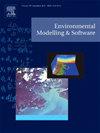典范和共同利益
IF 4.8
2区 环境科学与生态学
Q1 COMPUTER SCIENCE, INTERDISCIPLINARY APPLICATIONS
引用次数: 0
摘要
模特如何才能为大众的利益做得更好呢?叙述和反叙述都可以回答这个问题。后者在这里认为,模型可能滥用他们的认识权威的原因场合,机会和兴趣。一个解决方案要求更多学科和参与者的参与,但是由于目前的治理、实践和科学环境,这些本身是不够的。如果不进行彻底的重置或改革,变革将是困难的。本文章由计算机程序翻译,如有差异,请以英文原文为准。
Models and the common good
How can models do well for the common good? Narratives and counter-narratives are possible to answer the question. The latter are taken here to argue that models may misuse their epistemic authority for reasons of occasion, opportunity and interest. A solution calls for the involvement of more disciplines and actors, but these are not by themselves sufficient due to the present governance, practice and circumstances of science. Short of a radical reset, or Reformation, change will be difficult.
求助全文
通过发布文献求助,成功后即可免费获取论文全文。
去求助
来源期刊

Environmental Modelling & Software
工程技术-工程:环境
CiteScore
9.30
自引率
8.20%
发文量
241
审稿时长
60 days
期刊介绍:
Environmental Modelling & Software publishes contributions, in the form of research articles, reviews and short communications, on recent advances in environmental modelling and/or software. The aim is to improve our capacity to represent, understand, predict or manage the behaviour of environmental systems at all practical scales, and to communicate those improvements to a wide scientific and professional audience.
 求助内容:
求助内容: 应助结果提醒方式:
应助结果提醒方式:


